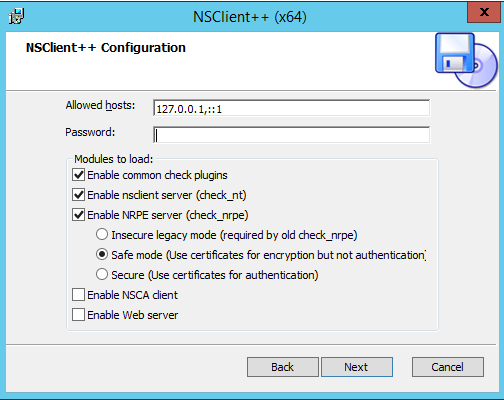Setup Remote Access: Difference between revisions
Jump to navigation
Jump to search
| Line 12: | Line 12: | ||
==Setup the Linux server with the NSClient (the server part)== | ==Setup the Linux server with the NSClient (the server part)== | ||
*Install NSClient Server part to the myLVS client | |||
root@myLVS-LinuxClient:~# '''apt-get install nagios-nrpe-server''' | root@myLVS-LinuxClient:~# '''apt-get install nagios-nrpe-server''' | ||
*Add to sudo | |||
nagios ALL=NOPASSWD: /sbin/ipvsadm | nagios ALL=NOPASSWD: /sbin/ipvsadm | ||
nagios ALL=NOPASSWD: /sbin/init | nagios ALL=NOPASSWD: /sbin/init | ||
Revision as of 20:39, 4 July 2015
This is the remote access basic. NSCLIENT is used for the myLVS communication
between the myLVS host (client) and the real server which are required to run
the NSCLIENT server part. For more information about NRPE please see http://www.nsclient.org
Setup myLVS with the NSClient (the client part)
- On Debian8 run the installation command
root@mylvs01:/# apt-get install nagios-nrpe-plugin -s
- Check to see if the plugin runs without any error, run:
/usr/lib/nagios/plugins/check_nrpe
Setup the Linux server with the NSClient (the server part)
- Install NSClient Server part to the myLVS client
root@myLVS-LinuxClient:~# apt-get install nagios-nrpe-server
- Add to sudo
nagios ALL=NOPASSWD: /sbin/ipvsadm nagios ALL=NOPASSWD: /sbin/init
- Edit /etc/nagios/nrpe.cfg
- Set Allowed hosts
allowed_hosts=127.0.0.1 192.168.2.100
- Set dont blame
dont_blame_nrpe=1
